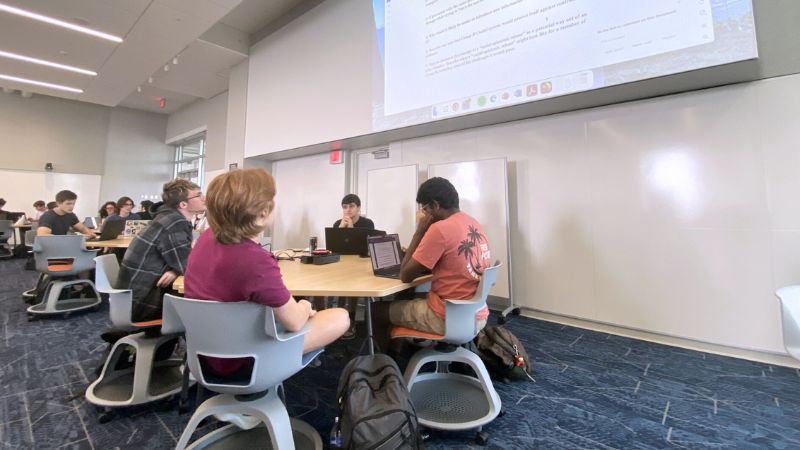Interdisciplinary Classes Bring Students Together to Tackle Challenges of Humanity From Multiple Perspectives
Exploring Solutions from Varied Viewpoints
Held at the Student Hall for Exploration and Development (SHED), the courses will explore issues and ideas such as modern day piracy in today’s technological age; the life cycle, sustainability, and societal significance of textiles; the information revolution aided by ubiquitous tech devices; and how the creative process of worldbuilding can be used to help us better understand global current events, important historical moments, and even our own life paths.
These project-based courses are designed to guide students in exploring ethical and social problems and creatively formulating possible solutions. Along the way, they’ll build and strengthen valuable workplace skills like teamwork, communication, collaborative problem solving, and critical thinking.
“These courses provide first year students with hands-on experiences in the power of the liberal arts to address ongoing challenges. They really fulfill a few key goals all at once. They’re project-based and hands-on, they showcase the enduring questions that the liberal arts grapple with, and they also demonstrate the interdisciplinary nature of modern problem-solving,” said College of Liberal Arts Associate Dean of Academic Affairs and Professor of Political Science Lauren K. Hall, Ph.D.
For example, in the ITDL 150-01 Interdisciplinary Explorations of Human Problems course section on piracy, led by Associate Professor Sarah Burns, Ph.D., and Department of English Associate Professor Amit Ray, Ph.D., teams of students collaborate to create a simulation of two wars and a humanitarian intervention that occurred in the early nineteenth century.
Prior to the simulation, students get guidance on team building from Assistant Professor Kristin Bain, Ph.D., from the Department of Management at the RIT Saunders School of Business and instruction on communication best practices from School of Communication Principal Lecturer and Expressive Communication Center Director Elizabeth Reeves O'Connor, Ph.D. Under the guidance of Department of English Associate Professor and Director of the RIT Center for Worldbuilding and Storytelling Trent Hergenrader, Ph.D., they learn how simulations can provide a deep and effective way of understanding and exploring real-world challenges.
Finally, in the last week of class, Tufts University Associate Professor of Cybersecurity Policy Josephine Wolff, Ph.D., who recently worked in the Biden administration on cybersecurity policy and implementation of systems to monitor threats, delivers a guest lecture about cyberwarfare and the current state of cybersecurity in the U.S.
"I am thrilled to see the College of Liberal Arts embracing a multidisciplinary approach that not only deepens our understanding of contemporary challenges but also sharpens the critical skills essential to tackle those challenges. By connecting liberal arts with science, technology, and design, we are preparing our students to think creatively and ethically about the world around them," said Kelly Norris Martin, Ph.D., interim dean of the College of Liberal Arts (CLA).
Development of the curriculum for the courses was supported by funding from CLA National Council Member Joyce Pratt, whose own professional experiences underscored the value of solving problems by examining them from diverse, multiple perspectives.
The engaging experience these interdisciplinary classes provide has fueled continued interest. Plans are already underway to offer similar courses next fall semester.



